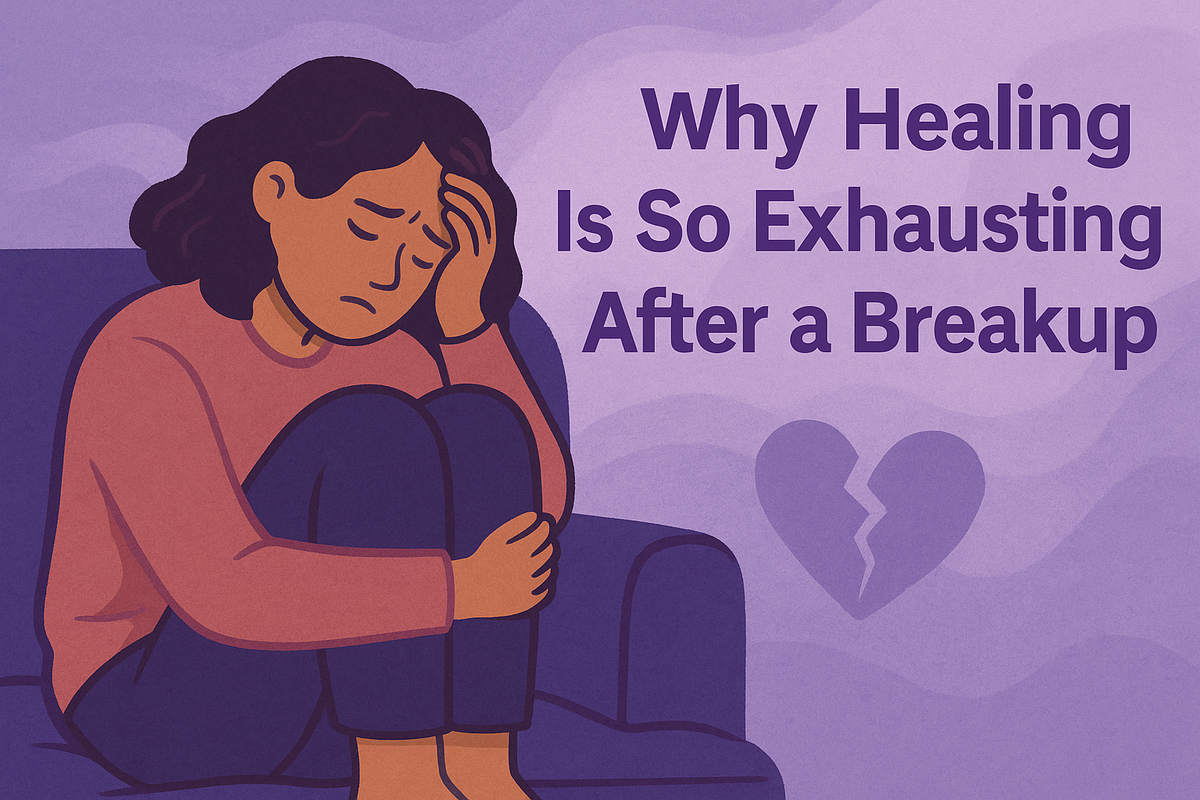Why Healing Is So Exhausting After a Breakup

This Wasn’t Just a Breakup
I’ve been watching someone I love sit in the thick of heartbreak.
It’s not the dramatic, movie-scene kind — no throwing things or screaming into pillows. It’s quieter. Heavier. Slower. The kind of grief that lingers behind the eyes and in the bones.
They weren’t expecting the end to come the way it did.
They thought it had already been worked through. Trust had been rebuilt.
But then came the truth — not all of it was in the past.
And now, they’re left trying to heal not just from loss, but from deception. From shame. From the gut-punch of realizing they weren’t crazy, they were right.
And it’s exhausting.
Why Healing After Betrayal Hits So Damn Hard
When someone hurts you, but you still loved them — that’s a special kind of pain.
Especially when you gave them grace. Especially when you believed them the first time. The second time. The third.
This wasn’t physical cheating.
It was likes on strangers’ posts at midnight.
It was secrets and digital footprints carefully erased.
It was a habit that turned into hiding — a silent addiction wrapped in “it’s not a big deal.”
It was gaslighting by omission.
And when the truth came out, the reaction wasn’t remorse.
It was anger… because they got caught.
Not because they caused pain — but because their mask slipped.
You’re Grieving What Was AND What Could’ve Been
Breakups hurt. But breakups with betrayal? They carry layers.
You’re not just missing the person — you’re mourning the future you thought you had. The version of the story you were writing together. The one you defended when your gut whispered something’s off.
And now, every memory comes with a shadow.
You Keep Questioning Your Own Judgment
The hardest part isn’t what they did.
It’s what you did after — you stayed. You forgave. You hoped.
And now the guilt creeps in:
- Why didn’t I leave sooner?
- Why did I believe them again?
- How did I miss this for so long?
But here’s the truth: you didn’t fail.
You trusted someone you loved. That’s not weak — that’s human.
You’re Fighting the Urge to Blame Yourself
They lied. They hid things. They crossed boundaries.
But somehow… you’re the one taking the blame.
Because you snooped. Because you asked questions.
Because you wanted to believe.
Let me say this loudly for the people in the back:
Finding the truth in someone else’s phone does not make you the villain.
They didn’t lose your trust because you looked —
you looked because they already lost it.
The Healing Feels Like a Full-Time Job
Even when you’re doing “the right things” — therapy, journaling, energy healing, rest — the exhaustion doesn’t let up.
Why?
Because healing after betrayal isn’t just emotional. It’s neurological.
Your brain is rewiring itself. Your nervous system is in survival mode.
You’re learning how to feel safe again — with yourself, with others, with the idea of love.
And that takes everything.
You wake up and the simplest tasks feel monumental. Showering. Eating. Returning texts. Going to work. It’s like your energy has been drained by an invisible force.
That’s because you’re not just tired — you’re in the middle of a full-body response to a traumatic event.
The body remembers, even when the mind wants to move on.
You’re not weak — you’re processing years of pressure and unspoken fear. Your nervous system is recalibrating.
You’re slowly reclaiming peace in your daily life, one boundary, one breath, one ugly cry at a time.
The Silent Toll of Being Alone With It
There’s a nagging voice that tells you to “just get over it.”
Ignore it.
Healing takes time. Real healing — the process of emotional healing — takes rest, reflection, and sometimes the discomfort of being alone with your thoughts.
It’s okay to feel your chest cave in for no reason.
It’s okay if memories resurface out of nowhere.
That’s just your heart trying to metabolize traumatic memories it wasn’t ready to face until now.
You might feel like you’re going backward. But you’re not.
You’re unlearning pain. That’s forward motion.
If You’re in That Place Right Now
You don’t have to pretend you’re okay.
You don’t have to forgive overnight.
You don’t have to be grateful for the lesson yet.
You’re allowed to:
- Feel mad
- Miss them
- Regret trusting again
- Wish it could’ve been different
- And still know that walking away was the most loving thing you’ve done for yourself
This kind of healing is grief + confusion + courage + silence.
It’s slow. It’s draining.
And yes — it’s unbelievably exhausting.
This Is What Real Personal Growth Looks Like
Not the kind with sunshine and mantras and fresh journals.
The kind where you feel like your world is crumbling… but you still get up and feed yourself.
Where your daily life feels unfamiliar.
Where every task feels like a mile.
Where your voice shakes but you speak up anyway.
This is your healing journey. And like all personal growth, it’s messy.
It’s not always beautiful, but it is always worth it.
You may feel stuck in survival mode, but I promise: this is transformation.
What Comes After the Exhaustion
One day, it won’t feel like you’re carrying a brick in your chest.
You’ll still remember what happened — but it won’t own you.
You’ll take a deep breath and realize: I’m back.
So until then:
- Rest.
- Cry.
- Journal.
- Scream into a pillow.
- Reach out to the people who help you come back to yourself.
- Explore energy healing or breathwork or movement.
- Let the world be quiet if it needs to be.
You’re not rebuilding who you were before them.
You’re becoming someone stronger, wiser, and more honest.
Not because of what happened.
But because of how deeply you chose to heal after it.
Healing Takes Everything, But It Gives You Back More
It’s okay if you’re not okay.
It’s okay if one moment you’re fine, and the next you’re crying over a song.
It’s okay if your energy levels fluctuate so much that you cancel plans just to sit in silence.
Healing is exhausting — not just emotionally, but physically.
The physical exhaustion of carrying intense emotions day after day is real.
It’s not just in your head. It lives in your body. In your chest. In your jaw. In your gut.
Sometimes, healing means sitting with the overwhelming presence of a memory that won’t let go.
Sometimes, it’s facing the echoes of your past through inner child work, unlearning the beliefs you picked up just to survive.
You might go through a session of therapy, feel like you’ve made progress, and then spiral again two days later. That’s not regression — it’s the pace of therapy doing what it does: slow, layered, and deeply human.
You’ll crave a deeply relaxed state, but your nervous system might still be in high alert. You’ll want to move on, but your body says, not yet.
It takes a long time to truly arrive back in the present moment — where you’re no longer reliving the betrayal, but existing beyond it.
And one day, you’ll notice:
You’re not just surviving anymore.
You’re grounded.
You’re steady.
You’re healing — and it shows.
By: Jess E
